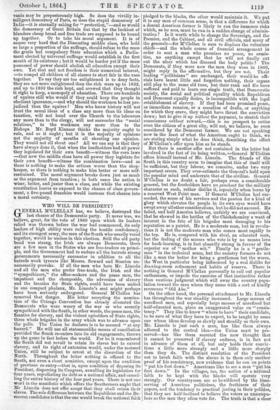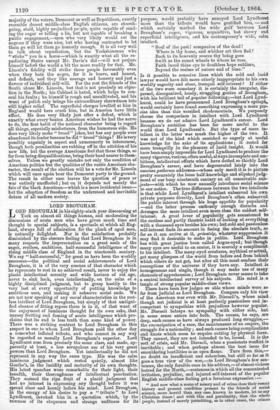WHO WILL BE PRESIDENT?
GENERAL M'CLELLAN has, we believe, destroyed the last chance of the Democratic party. It never was, we believe, great, for the vote of 1860 upon which its leaders relied was thrown before the war had commenced, its only leaders of high ability were ruling the hostile confederacy, and its strongest army, the men of the South who usually voted together, would be useless in this election. Still the old party bond was strong, the Irish are always Democrats, there are a few men in the States who are free-traders on princi- ple, and the Government had to endure a'.1 the hatreds strong governments necessarily encounter in addition to all the hatreds weak tyrants like Messrs. Seward and Stanton un- necessarily provoke. If all the men who hate Mr. Lincoln and all the men who prefer free-trade, the Irish and the "sympathizers," the office-seekers and the peace men, the impatient and the changeable, the advocates of slavery and the fanatics for State rights, could have been united in one compact phalanx, Mr. Lincoln's seat might perhaps have been seriously endangered. General M'Clellan has removed that danger. His letter accepting the nomina- tion of the Chicago Convention has already alienated the Democrats who were weary of the war or who secretly sympathized with the South, in other words, the peace men, the fanatics for slavery, and the violent upholders of State rights, three whole brigades in the army which was to advance upon the polls. The Union he declares is to be secured " at any hazard." Ile will use all statesmanlike means of conciliation provided the South re-enters into its old engagements, throws up the game in fact before the world. For be it remembered the South did not revolt to retain its slaves but to extend slavery, and its right of extension would, under the restored Union, still be subject to arrest at the discretion of the North. Throughout the letter nothing is offered to the South, not even a short armistice, except upon the condition of previous re-entry—that is, upon condition of deposing its President, dispersing its Congress, annulling its legislation for four years, repudiating its debt as a national affair, and cancel- ling the entire history of the four past years. There is not one word in the manifesto which offers the Southerners aught that Mr Lincoln does not offer except that they shall retain their slaves. The sole difference between the Republican and the De- mocrat candidates is that the one would break the national faith
pledged to the blacks, the other would maintain it. We put it to any man of common sense, is that a difference for which a decent American farmer is likely to run the immense risks which, as he sees, must be run in a sudden change of adminis- tration? Is it worth while to change the Sovereign and the Premier, and the Cabinet, and all civil officials, and many of the generals—for M'Clellan is sure to displace the volunteer chiefs—and the whole course of financial arrangement in order to seat a man who promises no peace, no armis- tice, no anything except that he will not finally cut out the ulcer which has diseased the body politic ? The Democrats, if they were now the men they were in 1860, might reply in the affirmative, but they are not. Their leading "politicians" are unchanged, their would-be offi- cials have learnt little and forgotten nothing, their organs still play to the same old tune, but their rank and file have suffered and paid to learn one single truth, that Democratic society, the social and political equality which Republican and Democrat equally desire, is incompatible with the legal establishment of slavery. If they had been promised peace, or immediate reunion, or a cessation of drafts or anything for which they crave, they might have thrust the conviction down ; but to give it up without the payment, to stretch their consciences without reward,—this is no prospect to entice even the citizen of a great city, will not, we believe, be even considered by the Democrat farmer. We are not speaking now in the least of what the American ought to think, we are stating simply what he does think, describing the effect of M'Clellan's offer upon him as he stands.
But there is another offer not contained in the letter but involved in the fact of its being written,-:–General M'Clellan offers himself instead of Mr. Lincoln. The friends of the South in this country seem to imagine that this of itself will be sufficient, but they labour, we conceive, under two very important errors. They over-estimate the General's hold upon the popular mind and underrate that of the civilian. General M'Clellan is no doubt a fair, perhaps even a considerable general, but the freeholders have no penchant for the military character as such, rather dislike it, especially when borne by a reserved West Point man. If General M'Clellan had suc- ceeded, the sense of his services and the passion for a kind of glory which elevates the people in its own eyes would have swept away all other considerations, but he did not succeed. Ho failed, and half America believes, unfairly we are convinced, that he showed in the battles of the Chickahominy a want of interest in the fate of his brigades most damaging to his reputation as a patriot. He is a moderate man, but in revolu- tions it is not the moderate man who comes most rapidly to the top. He is, compared with his rival, an educated man, but the feeling of the masses who vote is by no means love for book-learning, is in fact absurdly strong in favour of the superior use of " mother wit." Finally he is a "gentle- man "in the technical sense, but the country farmers do not like a man the better for being a gentleman but the worse, the West in particular being influenced by a real dislike for drawing-room refinement and habits of reserve. There is nothing in General M'Clellan personally to call out popular enthusiasm, or impede the exercise of that instinctive rather than cautious judgment which will sway the country popu- lation toward the man whom they name with a sort of kindly reverence "Old Abe."
On the other hand, the personal attachment to Mr. Lincoln has throughout the war steadily increased. Large masses of unrefined men, and especially large masses of unrefined but half-educated men, place an exaggerated value on " consis- tency." They like to know" where to have" their candidate, to be sure of what they have to expect, to be taught by some one whose ideas develop as slowly and steadily as their own. Mr. Lincoln is just such a man, has like them always adhered to the central idea—the Union must be pre- served—has like them, secreted the new thought that it cannot be preserved if slavery endures, is in fact not in advance of them at all, but only holds their convic- tions a little more strongly and a little more sharply than they do. The distinct resolution of the President not to break faith with the slaves is to them only another proof of his consistency, new evidence that he can on points "put his foot down." Americans like to see a man "put his foot down." In the villages, too the notion of a national faith to be kept with the blacks will operate very strongly. Our countrymen are so bewildered by the time- serving of American politicians, the frothiness of their papers, and the tendency to practical jesting in their politics, that they are half-inclined to believe the voters as unscrupu- lous as the men they often vote for. The truth is that a clear majority of the voters, Democrat as well as Republican, exactly resemble decent middle-class English citizens, are church- going, staid, highly prejudiced pelple, quite capable of sand- ing the sugar or telling a lie, but not capable of breaking a public engagement,—men who very likely would eat the negroes if they were nice, but who having contracted to let them go will let them go honestly enough. It is all very well to talk about repudiation, but the Yorkshireman who "sticks" you in a horse—which is exactly what all the re- pudiating States except Mr. Davis's did—will not perjure himself befort the world a bit the more readily for that. Mr. Lincoln's fidelity will strike these people favourably even when they hate the negro, for it is brave, and honest, and defiant, and they like courage and honesty and just a flavour of individual self-will. For the rest the friends of the South abuse Mr. Lincoln, but that is not precisely an objec- tion in the North ; his Cabinet is hated, which helps to con- ceal his faults ; he himself la rough and uncultivated, and his want of polish only brings his extraordinary shrewdness into still higher relief. The superficial charges levelled at him in England would here crash him, but in America have little effect. He does very likely jest after a defeat, which is exactly what every-beaten American wishes he had the nerve to do, the first habit of the national character being to regard all things, especially misfortunes, from the humorous side. He does very likely make "broad" jokes, but has any people ever abandoned its leader because he did" broad" things? He is very possibly ungainly in aspect and unmannerly in intercourse, though both peculiarities are rubbing off in the attrition of his new life, but the qverage Americans feel that these things, so far from being disqualifications, bring their head nearer to them- selves. Unless we greatly mistake not only the condition of American politics but the qualities of the rustic American cha- racter, the result of the election will be a vote for Mr. Lincoln which will once again bear the Democrat party to the ground. The result in either case leaves the question of peace or war entirely unaffected ; but on it depends not merely the fate of the black American—which is a mere incidental issue— but the adoption of freedom as the understood and inevitable datum of all modern society.































 Previous page
Previous page